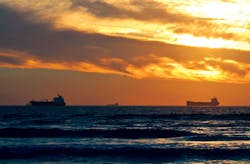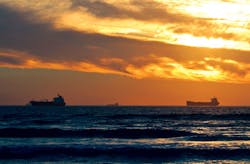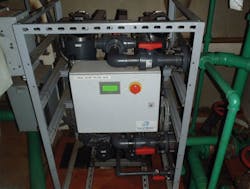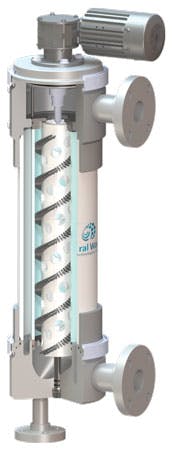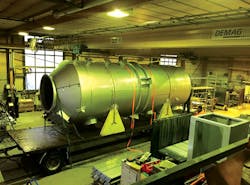By Dave Peterson
International shipping regulations designed to reduce particulate emissions went into effect in 2015. The Great Lakes region became the proving grounds for what is expected to be an industry-wide retrofit to be completed by 2020. For a 1,004-foot iron ore carrier working the Great Lakes, a recent advancement in water filtration has helped the ship’s operator meet regulatory mandates while preventing operational downtime.
Regulations target ship engines and boilers, requiring exhaust system upgrades to reduce the emission of sulphur oxides and other compounds into the atmosphere. To solve these emission problems, technologies such as stack gas scrubbers are being deployed. Several Great Lakes shipping companies have been the earliest to comply with the global regulations. One company is planning to have a third of its fleet retrofitted by the end of this year. Maritime operators in other parts of the world are expected to complete the mandated emission control upgrades by 2020.
Upset Conditions Require Better Protection
Scrubbers rely on spray nozzles and a water supply to knock down airborne pollutants. Whether in open sea or freshwater bodies like the Great Lakes, the water must be filtered to prevent nozzle plugging. Ships going into port for loading and unloading create “upset conditions” - high turbulence from both propellers and bow thrusters stirring up sand and debris. This has presented a challenge for naval architects and system engineers to resolve.
Clogged nozzles prevent the scrubbers from operating properly, and nozzle cleaning can create a costly and time-consuming shutdown. For shipping companies that rely on tightly maintained schedules, unexpected downtime is a constant concern. The issues are perhaps more pronounced in the Great Lakes, where ships frequent shallow waters containing sediment, biological debris and algae, and where winter conditions add ice chips to the list of potential filtration hazards.
In the summer of 2015, the aforementioned iron ore carrier underwent a regularly scheduled upgrade that included a stack gas scrubber retrofit to meet the new emission standards. The ship is a bulk cargo carrier built in 1978 that is used primarily to transport iron ore across the Great Lakes. The ship is powered by two Pielstick 16-cylinder, four cycle, heavy fuel-burning diesel engines, requiring a fresh water diesel emission scrubber to remove soot, gas emissions and other particulates. To avoid nozzle plugging, the naval architect investigated self-cleaning nozzles and systems requiring multiple filters, but those options added cost and maintenance and have not always proven effective.
Automatic Water Filtration Delivers High-Level Solution
The ship’s filtration challenge was well suited for Spiral Water Technologies, a California company specializing in difficult-to-treat waters. Spiral Water’s Automatic Self Cleaning Filter was originally developed under a U.S. government grant, and its flagship product is capable of handling the extremely high Total Suspending Solids (TSS) loading needed to protect industrial equipment in demanding applications. While conventional automatic filters and strainers are limited to less than 500 ppm of suspended solids, the Spiral Water Filter is capable of handling over 25,000 ppm.
Protecting Valuable Equipment and Operational Uptime
A representative of Spiral Water boarded the ship in the summer of 2015 to inspect the scrubber installation and help implement its automatic water filtration technology. Spiral Water supplied a Model FS2 filter system to work in conjunction with the ship’s diesel emission scrubber. Each filter contains a motor-driven, spiral-shaped brush that continuously cleans collected debris from inside the filter element. Solids collected at the end of the filter housing may be expelled through an automatic purge valve.
The system does not require high pressures to operate, and it performs at very low differential pressure (<1 psi). No backwash, crossflow or booster pumps are required. The filter system operates at a flow rate of 65 gpm and filters down to 50 microns. It is fabricated from robust, corrosion-resistant materials and is ideal for maritime operation. It has proven highly effective in protecting the scrubbers that allow this ship to meet the new emission regulations while protecting the company’s valuable operational uptime.
Meeting the Wave of the Future
Emission regulations are scheduled to go into effect in other parts of the world over the coming months and years. Effective, affordable automatic water filtration technology is a necessity. The ability of these automatic filter systems to handle extreme upset conditions is paramount in an industry that often works in murky waters and can’t afford unexpected downtime.
About the Author: Dave Peterson is business development manager of Spiral Water Technologies (www.spiralwater.com), a developer of advanced filtration solutions for difficult-to-treat waters. He can be reached at [email protected].
